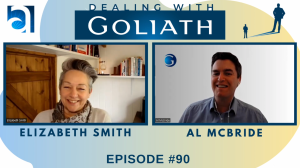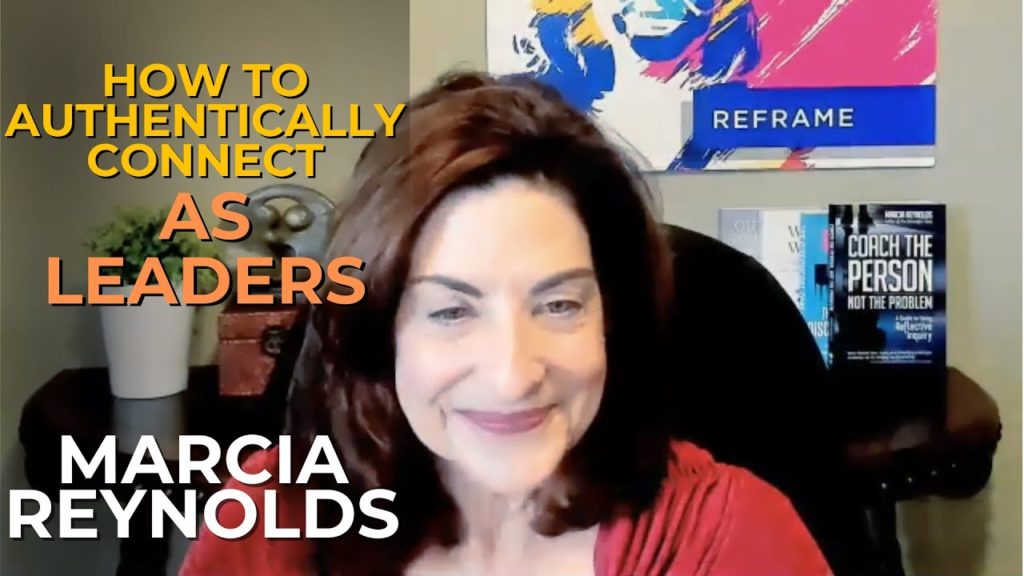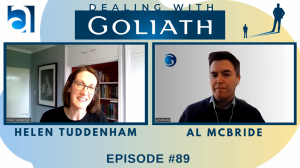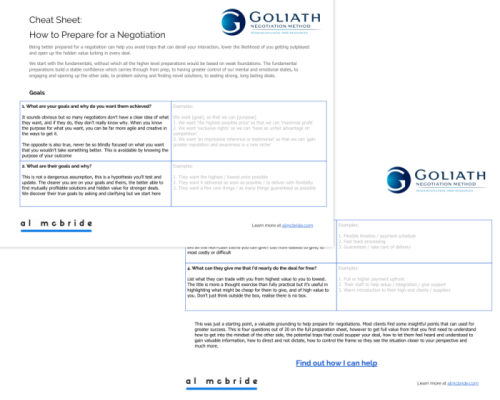

How to Authentically Connect as Leaders with Marcia Reynolds (#035)
Show Notes:
Dr. Marcia Reynolds is an expert on how to use your emotions to manage your mind. She has taught in 41 countries and reached thousands more online. Her clients include AT&T, American Express, Harvard Kennedy School, Cornell University & Moscow School of Management to name but a few.
Excerpts from Marcia’s books Outsmart Your Brain; The Discomfort Zone and Wander Woman have appeared in business and psychological publications around the world.
Her latest international bestseller, Coach the Person, Not the Problem: A Guide to Using Reflective Inquiry, was released this past June to rave reviews by coaches and organizational leaders.
Topics explored:
- What does it really take for leaders to be better?
- First what stops leaders, then what they should do
- What’s getting in my way of doing what I think I should do
- Change is a transformational process that takes time
- Leaders often don’t want to admit they need courage
- We’re getting better as employees are demanding we listen, acknowledge and value them
- Leaders are forced to become more connected with others
- The younger employees are quicker to say ‘I’m out of here’
- We have a radar for authenticity
- Presence has more impact than the words you choose
- You have to bring the right energy to those conversations
- Emotional reflection before the conversation
- Do what athletes do to prepare
- What to do if you feel off balance in the conversation
- Develop connected presence
- Set an emotional intent
- Leaders misunderstand the word ‘listening’
- Can you fully receive and appreciate what the other is communicating?
Transcript
Al McBride 0:04
Welcome to the dealing with Goliath podcast. The mission of dealing with Goliath is to sharpen the psychological edge of business leaders with skin in the game, who want to be more effective under pressure, uncover hidden value, and increase profitability.
Al McBride 0:18
With expert guests across the business spectrum. We deliver gems of wisdom delving into their methods, their thinking and approach to business life and to problem solving. This is the double espresso shot of insight through our short interview format, where we’re concise with five questions in about nine minutes.
Al McBride 0:37
I’m your host Al McBride, and my guest today is Dr. Marcia Reynolds
Al McBride 0:43
Dr Marcio Reynolds is an expert on how to use your emotions to manage your mind. She has taught in 41 countries and has reached 1000s more online. Her clients include at&t, American Express, Harvard, Kennedy School, Cornell University and the Moscow School of Management.
Al McBride 1:03
And that was a much longer list that they really condensed down. It’s very impressive Excerpts from Marcia’s books, outsmart your brain, the discomfort zone, and Wonder Woman have appeared in business and psychological publications around the world.
Al McBride 1:19
Her latest international bestseller Coach, the Person not the Problem, a guide to using Reflective Inquiry, was released this past June to rave reviews by coaches, and organizational leaders.
Al McBride 1:30
And it’s one that I’ve just bought myself, actually, I’m very much looking forward to getting into and in the days after this call, so Marcio, welcome to the show. It’s fabulous to have you on. No, thank
Marcia Reynolds 1:42
you. Thanks for asking me.
Al McBride 1:45
Oh, no, not at all. Well, where are you joining us from today?
Marcia Reynolds 1:49
from Phoenix, Arizona,
Marcia Reynolds 1:51
where do usually Sunny, Sunny, sunny and today is overcast? So it’s like, oh, the lighting is not great.
Al McBride 2:00
You’re used to the perfect sunshine there. The edge of the desert feminist stuff. Yeah, I can assure you, it’s the opposite here in Dublin first. but yes, I enjoyed the season. So try and put a positive slant on it. So let’s dive in to the questions, Marcia. So who is your ideal client? And what’s the biggest challenge they face?
Marcia Reynolds 2:25
Well, because I came out of the corporate world, my idea clients is executives, and leaders and high potentials and corporations, because that’s, that was my background, I spent 16 years in companies and and trying to figure out what does it really take for leaders to be better.
Marcia Reynolds 2:43
But that took a lot of years to figure out. It’s not like you can read a book and figure it out a book can help. But to really look into more, what stops them, then what they should do. They always know what to do. But why don’t they do it? So that’s what I researched for many years. Yeah. And that’s what we even why I got into coaching, because coaching really does work to uncover what’s getting in my way of doing what I think I should do.
Al McBride 3:15
It’s an incredibly interesting point, because as you said, particularly the higher you go, whether they’re successful entrepreneur, as you say, CEO or C suite, they usually have a pretty good idea of what to do with it. Rather than that, that confusion of not knowing what to do. That’s a very interesting point. So what are some of those common mistakes people make when they try to solve that problem?
Marcia Reynolds 3:41
Well, oftentimes, they’ll go to training programs, they’ll read books, and they’ll say, I want to do this. And then they’ll start and it feels very awkward. And they say, Oh, this doesn’t work. And they go back to their old behavior, you know, and so there’s a lot of statements and research that people don’t change.
Marcia Reynolds 3:59
Well, they don’t change abruptly. And and I think that’s the expectation, if I try this, I’ll see results, and then I’ll continue, they don’t realize that changing behavior is really a transformational process, which takes time. And generally we slip and fall a lot as we learn. Yeah, I mean, because learning is always from mistakes. So it feels awkward. So what feels awkward let me stay at it.
Marcia Reynolds 4:29
And and and then at the end of the day, say what did I learn about this and set little incremental goals instead of huge ones. So we create habits of, of listening and being with people in a more engaging way. And 30 or 40 years, it’s the same thing of why leaders don’t do what they know they should do.
Marcia Reynolds 4:55
But when they start to recognize those blind spots, and what they’re saying to them, selves and being honest about that they need courage because a lot of times they don’t want to admit any courage. But that’s what they need in order to stick with it. And just saying that out loud makes a difference.
Al McBride 5:16
That’s fascinating. Just as a question on that, do you find that there’s been any changes really in, in the the general behaviors of some of your clients over say, you mentioned 30 years or over that time period? Or is it even with all the tech in the world and all supposedly, we’re so much more enlightened now that even 30 years ago, it’s still pretty much those same problems that you encountered when use when you started in this field? Oh,
Marcia Reynolds 5:45
well, it’s the same problems, but we’re getting better. That’s because what I love is the employees are demanding it. You know, so when I first started, and for the many years that I worked, I always wanted my boss to be a certain way to listen to me to acknowledge me to value me.
Marcia Reynolds 6:04
But I didn’t expect it, it was just been nice. Now, the employees, they’re expecting it, you need to recognize me and develop me. And so there’s a demand that’s pushing leaders to change that I’ve seen, you know, like, over the last decade, at least, if not 15 years.
Marcia Reynolds 6:25
But then with the pandemic, that pushes even more, because the emotions are intense. People don’t know what they’re going through, and I need you as a leader to just listen to me, you know, and help me understand what’s going on. So empathy, it’s real ambiguity, you know, embracing that I don’t know what’s going to happen, and being able to say that it’s now real, it’s not just, you know, an abstract thing you learned in a class or reading a book, you know, so what’s happening is, is the employees and the world in life are forcing leaders to become more connected with others, and not just about KPIs and goals. It really Exactly.
Al McBride 7:12
That’s fascinating. It sounds like it’s very much in that idea of now everyone’s a leader. And, as we all know, one of the most difficult management or leadership roles is having to lead upwards to someone who’s technically in a hierarchy above you. And yet, as he said, that’s what’s actually spurring a lot of the change. That’s fascinating.
Marcia Reynolds 7:38
Mm hmm. Well, I’m even in, you know, things have changed economically. But over the last 15 years, the the retention is huge, you know, the younger employees, just, they’re quicker to say, I’m out of here, I’ll go do something else. You know, for a long time, certainly, my parents were like, No, you have to stay with what you have, you know, and then there was you develop a career, you stay on one path, well, that’s just not the way it is anymore.
Marcia Reynolds 8:11
And started really, really shifting around 2005 2006, then we hit that recession. And again, you think people would get scared, and they’d stay. But they’re saying, Well, okay, well, now’s the time for me to change, you know, and what’s my life purpose and, and making big changes, and so you can’t count on, that people are just gonna stay out of loyalty or for a paycheck.
Al McBride 8:39
But that’s very interesting that you’ve mentioned two opposing ends of changing quickly being a bad thing, as I said, younger generations demanding the change, they’re not willing to stay if it’s not, right. Whereas leaders need to actually lean in and not change their, what they’re trying what they’re experimenting with, too quickly. Pivot some time in the behavior change is very interesting to different ends of it. Okay? Very good.
Marcia Reynolds 9:09
Because if they attempt to change too quickly, it’s not sincere. And we know it. You know, we have a radar system for what’s authentic and what’s not. And like, you don’t really care about me, you’re just pretending you’re just doing the thing that you learned from watching that webinar. And there’s got to be a real sincerity.
Marcia Reynolds 9:31
You know, and we’re just really coming to understand the impact of energy exchange between people of what’s going on that’s not about the words, you know, and like the presence you bring even remotely right now is so has so much, much more impact in the words you choose, you know, so that I’m sincere in wanting to know what is your experience right now. Please help me understand, there has to be a sincerity in that.
Marcia Reynolds 10:03
You know, I meant to say,I’m working on this, I’m doing the best I can. Hopefully, you know, we’re gonna establish an even even greater relationship in the future. There’s an energy we have to bring with those words that people go, yeah, I get it that I get, that’s what you want. I want that to
Al McBride 10:28
get the words have to be coherent with, as you said, the emotional resonance that your brain has to be in line does not show Yeah. Firstly, left even
Marcia Reynolds 10:39
before you go into a conversation. What am I feeling right now? And what am i believing about the person I’m about to talk to? You know, do I feel hopeful? Do I feel, you know, if I’m upset that I’m disappointed, I need to be willing to say, I’m disappointed because you didn’t do what you said. And I know you can. And I want for you, you know, to achieve more. So I want to help you. You know, I want to understand what’s going on with you and see if we can find a different way forward.
Al McBride 11:09
You’re starting to answer the next question is, what is one valuable free action that the audience can implement that will help them with the issues that we’re talking about it, and right there, we’re starting to hit into it that just arriving and actually being a little bit more mindful of, of what you’re going into.
Marcia Reynolds 11:30
Especially right now, with all that’s going on, and there’s low local levels of anxiety that we’re experiencing, and just things we don’t understand, to just take a moment before you go into any conversation. regulate your breathing, because our breathing gets out of whack, release tension in your body, send to yourself this, I learned from the athletes, you know.
Marcia Reynolds 11:54
You put your awareness in the center of your body, not in your brain, and then choose this is how I want to feel when I go into this conversation, and it just be one or two things. You know, I want to feel calm and courageous. I want to feel patient and compassionate. Whatever that is. Choose it breathe it in. And if it’s just one or two words, if you start to feel off balance in the conversation, you can just say there’s one or two words to yourself. And you’ll come back to that character compassionate and compassionate, connected presence.
Al McBride 12:30
It’s pretty interesting. Is that how you would set intent as well? Because it sounds like you’re setting an emotional intent rather than a specific goal orientated intent
Marcia Reynolds 12:41
Right? Yes, we have to set an emotional intention. That’s like the first thing. Yeah. How do I want to feel in this? You know, and then what do I believe in? Do I believe in the person’s potential? Because they’re going to know whether you believe in them or not? Yeah, so yes, your emotional intention and your belief you have to think about that quickly. Hmm. Before you enter that conversation.
Al McBride 13:07
Fascinating one fascinating one. So what is one valuable free resource that you can direct people to that will help them with this?
Marcia Reynolds 13:18
I’m well my website covisioning.com, there’s a lot of free stuff. Actually, under discomfort zone. There’s a page of training resources that has videos and, and things and, and there’s a secret page. If you if you search on my site for coach the person resources, you’ll find a secret page of videos and podcasts and all kinds of things that I had created when I was first selling the book as a bonus page. And it’s still sitting there. So and I add to it. So go to my secret page. That’s very
Al McBride 13:56
cool. And I have to say there, there is a wealth of goodies on the page. There’s all sorts of tools, there’s a resilience level tests there, there’s a checklist, there’s all sorts of fantastic stuff, really, really is quite something. So it’s far more than just one little freebie. It’s excellent stuff. And of course, is the first chapter of the book, which is well worth getting and having a reader. So what’s one question? I should have asked you, that would have been great value for our audience.
Marcia Reynolds 14:32
Question
Al McBride 14:33
so many?
Marcia Reynolds 14:37
Um, well, I think, you know, the, what’s the one thing that leaders totally misunderstand? And I think it’s the word listening. You know, they think they’re supposed to and I even said it during this, they need to listen, it’s not listening. In fact, I didn’t really like that word. It feels like it’s something I’m doing to you. It’s receiving. Can I fully receive what you’re giving me in your words, your expressions, which you’re not saying, Can I take it in and just digested before I analyze it and respond to you. So receive and appreciate what they’re sharing with you before you respond.
Al McBride 15:19
It’s a fabulous point. It’s a fabulous points. Excellent stuff. So thank you so much. Marcia we’ll pause the interview there. Thank you. As I said, it just, we just got a little tip of the iceberg there of a lot of your insight and your wisdom. So thank you for sharing with us today. Outstanding stuff. Cheers. Where can people learn a bit more about you or get in touch with
Marcia Reynolds 15:45
my website? You know, on my, my about page, on my website, it says, Who is Marcia? And there’s, you know, I talked about it, but you know, on the website, it shows all the things I do what I offer. And there’s a contact form there as well, if they want to reach out to me.
Al McBride 16:09
Excellent stuff. Marcia Reynolds, thank you very much for your time today. Cheers.
Marcia Reynolds 16:15
Yeah. Thank you.
Transcribed by https://otter.ai
Resources
- Marcia Reynolds website: Covisioning
- Amazon Book: Outsmart Your Brain, How to Master Your Mind When Emotions Take the Wheel, by Marcia Reynolds
- Amazon Author Page: Marcia Reynolds
- YouTube video: How Leaders Turn Difficult Conversations Into Breakthroughs with Marcia Reynolds, Talks at Google
- Videos & Podcasts: Coach the Person Not the Problem Page
- Marcia Reynolds Book Page with Multiple other Bonuses: Outsmart Your Brain Page
- PDF: First Chapter Outsmart Your Brain, by Marcia Reynolds
- PDF: Find Your Resiliency Rate, Bonus from Outsmart Your Brain by Marcia Reynolds
Connect with Marcia Reynolds
- Marcia Reynolds: About Marcia
Ready for more:
If you’re interested in more, visit almcbride.com/minicourse for a free email minicourse on how to gain the psychological edge in your negotiations and critical conversations along with a helpful negotiation prep cheat sheet.


